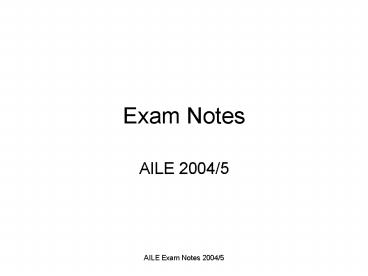Exam Notes PowerPoint PPT Presentation
1 / 17
Title: Exam Notes
1
Exam Notes
- AILE 2004/5
2
COURSE MATERIAL can be divided intoCore,
Background and Peripheral
3
Course Material Divided into..
- 1. CORE ESSENTIAL material
- (necessary to know and understand and be able to
critically evaluate this to pass) - 2. USEFUL BACKGROUND material
- (which should help improve and will be useful in
more general questions, or those where you need
to provide examples) - the more background you
have the more options you will have in your
question choice and answers. - 3. OTHER PERIPHERAL material
- (of wider interest)
4
Classify CORE material as
- content of my lectures
- (see current slide summaries on the course web
page) - core systems (see below).
5
Background Material
- materials listed as Background reading on the
course web page - other material covered for assignments
- material on Cognitive Tutors from practical
sessions - additional systems (see below)
6
Peripheral Material
- materials listed under resources,
- references from the lectures and
- any other reading
7
B. SYSTEMS you should know about ......
8
i. CORE CLASSIC SYSTEMS
- You should know about these classic systems from
reference to them in lectures - GUIDON (Clancey)
- SOPHIE I/II (Brown, Burton and DeKleer)
- WEST (Burton and Brown)
- BUGGY/DEBUGGY/IDEBUGGY (Burton, Brown)
- I will make copies of papers on these available
9
ii. CORE MORE RECENT SYSTEMS
- Assume you know about some (at least two) of
these in detail (i.e. knowing a couple is
essential knowing more is good background). - 1. ANDES (VanLehn, K., Weinstein, A., Conati,
C., Gertner, A) - 2. STEVE ( W.L. Johnson, J.W. Rickel)
- 3. ADELE (Shaw, E., Ganeshan, R., Johnson, W.L.)
- 4. AUTOTUTOR (Person, N. K., Graesser, A. C.,
Wiemer-Hastings, P.) - 5. GEOMETRY EXPLANATION TUTOR (Aleven, V.,
Popescu, O., Koedinger, K.R.)
10
iii. Background
- Other systems we've looked at that it would be
useful to know something about - ARTCHECK (Sentance)
- BEETLE (Moore et al)
- INTERMODELLER (Conlon)
- CONCEPTION (Conlon)
- RIDES (Munro)
- WHY (Stevens and Collins)
- QUEST (White and Frediksen)
- WUSOR (Goldstein)
- SCHOLAR (Carbonell)
- STEAMER (Hollan and Hutchins)
- MENO-TUTOR (Woolf and McDonald)
11
THE FORMAT OF THE EXAM
12
Format
- The format is similar to past Artificial
Intelligence and Education (MSc/UG4) year papers.
- There will be a choice of 3 questions (some may
have an either/or part). - You do any 2 questions
13
Style of Questions
- will usually be a Comparison of Approaches or
Design or Evaluation - may involve Specific Issues or Specific
Techniques or Specific Systems (see above) or
Specific Task - Could be a combination of these
14
e.g.1. Design Problem
- design of all or part of system
- (if latter, still need some idea of what it is
embedded in) - in relation to known systems or in relation to
particular approaches or focussing on particular
features of the problem.
15
Other Examples
- e.g.2. Define, exemplify and evaluate different
approaches to some issue. - e.g.3. Describe and compare some feature or
approach taken in several different systems. - A further option may be an Essay-Type Question,
which may be answered in a number of ways and
should bring in wider knowledge.
16
MarkingIn all questions higher marks will be
awarded for discussion and evaluation of material
rather than simple regurgitation of information.
17
CREDIT given for
- detail
- reference to relevant literature and research
- reference to systems
- use of examples
- critical comparisons
- discussion of strengths and limitations
- justification of conclusions

